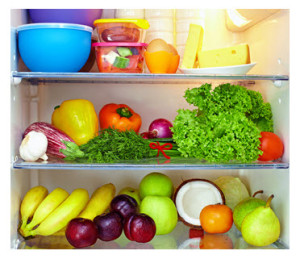 Open your fridge and scan. Then take my informal, two-question quiz.
Open your fridge and scan. Then take my informal, two-question quiz.
Do you have more than you can eat before it goes bad? Are there produce and dairy products morphing into hideous science projects?
If you answered yes to one or both of these questions, you just earned a Fridge FAIL.
Checking my own weekly perishables, I was convinced that I’d win a pass.
Sadly, I’m wrong.
I’m certainly less at risk for waste and spoilage than I was a few years ago, and here’s why: steamed veggies in a glass container (good for days); three additional glass containers holding kale, parsley, and a brown rice mixture (good for a week or more); homemade soup in a large pot (also good for a week).
But alas, two small Roma tomatoes are shriveling, a round covered bowl with salad is only barely intact, and a plastic box of pineapple spears won’t last more than 24 hours.
The inventory continues: a half dozen eggs (past expiration); uneaten yogurt (past expiration); skim milk (past expiration); light sour cream (don’t ask).
Food waste in America? Might you, like me, be part of the problem?
Color Me Concerned: Careless Consumption
Naturally, most of us would agree that it’s shameful to waste food. And yet we do, in massive quantities, despite trying not to overbuy, under-use or watch once beautiful produce wind up in the garbage.
Can’t we plan better? Can’t we pay attention? Are the issues around food waste more complicated?
 How many of us are careless consumers when it comes to food? Do we over-purchase without realizing, then throw out what we haven’t used? Shouldn’t we eat our leftovers, transform our leftovers, freeze our leftovers, or simply purchase less?
How many of us are careless consumers when it comes to food? Do we over-purchase without realizing, then throw out what we haven’t used? Shouldn’t we eat our leftovers, transform our leftovers, freeze our leftovers, or simply purchase less?
Are we encouraged to over-buy out of price consciousness, then find ourselves tossing out perishables despite our best intentions? And what about those expiration dates? Do we actually have longer to use many of our canned and packaged products (especially), and we just don’t know it?
I was raised with a “waste not, want not” mentality — no doubt one of many lessons of my upbringing resulting from parents who were children during the Great Depression — yet I nonetheless continue to waste more than I would like, and I wonder about the size and seriousness of the problem.
Statistics on U.S. Food Waste
The USDA reports on food waste in America and the numbers are staggering:
In the United States, food waste is estimated at between 30-40 percent of the food supply. This estimate, based on estimates from USDA’s Economic Research Service of 31 percent food loss at the retail and consumer levels, corresponded to approximately 133 billion pounds and $161 billion worth of food in 2010…
$161 billion worth of food. How does that translate into waste per person or waste per household?
A simplistic calculation might make these amounts more digestible. If we assume 100 million adults in the U.S., that $161 billion in waste equates to $1610 per individual per year.
Hmm. I could do a lot with $1610, couldn’t you? But looking at our own pockets, we need to adjust for the retail portion, which brings our household waste down to an average of $640/year according to this 2016 Business Insider report on food waste.
This same BI report puts household waste at 80 billion pounds of food a year… We throw out 80 billion pounds of food a year!
Money Down the Drain Isn’t All
This 2015 USA Today report elaborates on our money-down-the-drain habits and their far-reaching impacts:
… and consumers don’t really care about the environmental impact of trashed leftovers piling up in landfills, according to a survey… from the American Chemistry Council.
That mention of landfills? That’s no small potatoes. Even the 2015 USDA report cited above describes our food waste impacts as “far-reaching” on
… food security, resource conservation and climate change…
Food security. Wondering about that? Try looking at it this way: discussions on food insecurity, referring to the approximately 48 million Americans living in poverty, where:
- Households that had higher rates of food insecurity than the national average included households with children (19%), especially households with children headed by single women (35%) or single men (22%), Black non-Hispanic households (26%) and Hispanic households (22%).
- In 2013, 5.4 million seniors (over age 60), or 9 percent of all seniors were food insecure.
Meanwhile, we are wasting one third of our food supply each year.
Now, about those landfills and other costs we neglect to consider…
Hello, Natural Resources. Goodbye, Natural Resources.
Not only are our leftovers and excesses winding up in landfills, but the “real” cost of food is more than what we shell out for those cans, jars, boxes, packages and carefully selected produce.
Again, from the USDA report on food waste:
The land, water, labor, energy and other inputs used in producing, processing, transporting, preparing, storing, and disposing of discarded food are pulled away from uses that may have been more beneficial to society – and generate impacts on the environment that may endanger the long-run health of the planet.
What’s more:
Food waste, which is the single largest component going into municipal landfills, quickly generates methane, helping to make landfills the third largest source of methane in the United States.
That methane? It’s 84 times more potent than carbon dioxide in the short-term, and devastating when it comes to climate change.
A Little Planning Goes a Long Way
When even the U.S. Government is willing to clearly state the impacts, shouldn’t we listen? And while I haven’t expressly mentioned the retail side of this waste equation, can we — as consumers — at least do our part?
Wasting less food isn’t rocket science, but it does require more attentive choices and a small amount of planning in order to purchase more smartly, consume more consciously, and educate ourselves and our children accordingly.
 Although I have become far more adept at separating foods as soon as I get them home from the market, storing them in glass containers to extend their usage, freezing leftovers and making sure they are eaten — some food still spoils.
Although I have become far more adept at separating foods as soon as I get them home from the market, storing them in glass containers to extend their usage, freezing leftovers and making sure they are eaten — some food still spoils.
I misjudge at the market, I purchase too much in the name of a bargain, and I waste unintentionally — but waste, nonetheless.
I know I can do better, especially when I think about those who go without, and the destructive, too often unspoken cost to the environment.
Suggestions for Buying Food Smartly and Not Wasting
This article written in June 2013 offers practical suggestions for wasting less food. I’ve been following many of these recommendations, but a reminder is always useful.
Among the suggestions offered in the article are:
- Understand expiration dates; many products build a buffer into the dates
- Buy less, freeze what you can, freeze leftovers
- Check the temperature of your fridge; it may not be cold enough
Here are a few recommendations of my own.
- Reconsider your portion sizes. Are you overloading plates and throwing away what isn’t eaten?
- Consider glass containers to store fresh fruits and veggies in the fridge. Produce keeps longer in glass than in plastic containers.
- Try tracking the food you toss, even for a single week. You may be surprised. Adjust portions, purchases, and methods of storing.
- Excess produce? Make smoothies! Make juices! Make soups! These are all quick, and most will freeze beautifully.
You May Also Enjoy
Great post DA. We throw away very little food because Hubby goes snakey when we do. His mum was the same. So every carcass of chicken gets made into soup (made by him…bonus!) or if he doesn’t have time it gets popped into our freezer to be made later. And when we do have an avocado that goes wrong before we can get to it… it goes into the compost to help out our vegetable garden. Let me make clear that none of this is down to me. Okay..I am able to put stuff in the compost. But the garden and most of the grocery shopping is my husband’s terrain. One reason we stopped shopping at Costco and let our membership lapse was the size of everything…the packages of six or eight steaks or twelve buns… and sometimes the size of the food in the packages. We’d have to repackage everything and freeze it. Good for families, I guess.. but for two people… not so much. Besides Hubby found that by shopping around he found better deals with respect to price, and smaller sizes of things like meat. The portion size was too large to be healthy.
I too have been VIEWING my FOOD in the pantry and the refrigerator! I am in a CLEAN OUT MODE……. especially with the pantry! How many boxes of PASTA does one need? Then I buy more because it’s on sale and stack on top of the OLD!!! NO MORE……… weeding and cleaning out and as for my perishables. What goes BAD which is NOT much goes to the CHICKENS so nothing gets wasted HERE!!!!!!! XX
Excellent advice. But for me, it has more to do with age and empty nest. I raised 3 healthy Sons who were “Food Vacuum Tubes” and anything that was put in our refrigerator did not stay there more that 30 minutes. Now if I feel like cooking, I pick up something for that evening’s dinner on my way home from the golf course. My refrigerator looks like a Marine Corps Barracks!
What I meant to say was, my refrigerator is as CLEAN as a Marine Corps Barracks! I now try to buy only what I can cook and eat in one sitting. As the Topic has correctly illustrated: I have wasted so much money by buying too much food and having it spoil. The sad part is that most of it has been vegetables which I honestly do love. I am a very good cook, but I do NOT know how to keep leftover “Veggies.”
I seem to have found a formula that works: 2x a week I buy 3 types of vegetables, 3 types of fruit, 2x protein of some sort. I keep wild rice and lentils to make soups. Whatever has beeen sitting around a couple of days gets made into soup and eaten or frozen. Years of living alone and grandparents who went through wars…